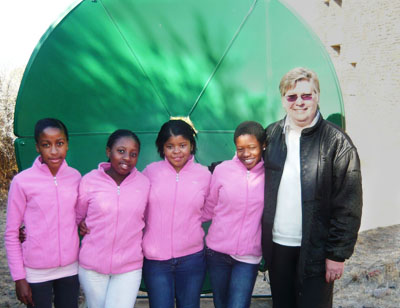 |
|
Romeo Motsie, Michelle Baadjies, Puleng Phalole and Thato Ntsebeng from the winning school, Unicom Primary School (Tweespruit) with Susan Usher, their teacher.
|
The National Astronomy Quiz for Grade 7 learners was recently hosted at the Boyden Science Centre, which is managed by the University of the Free State’s (UFS) Department of Physics. It was also Boyden and the UFS’s Department of Physics that coordinated the Free State leg of the competition. The Free State Department of Education was also on board to ensure smooth arrangements for the preliminary, as well as the first two official rounds of the competition.
The competition is hosted by the South African Agency for Science and Technology Advancement (SAASTA), an agency of the National Research Foundation (NRF).
Ninety schools from all over the Free State took part in the first official round. Eighteen schools qualified for the second round, once again with a balanced geographic coverage of the province.
During the second round, eight schools made it to the third round. Two of these schools were from Bloemfontein and the other six from other towns and rural areas in the Free State.
The third round and provincial finals took place at the Boyden Science Centre. The schools qualifying for the final round were Hennenman Primary School, Unicom Primary School (Tweespruit), Voorwaarts Primary School (Kroonstad) and Fichardt Park Primary School (Bloemfontein).
As a pleasant surprise, Unicom Primary School, a less well-known school from a smaller town, won the Free State finals. It was the first time this had happened since the inception of the competition.